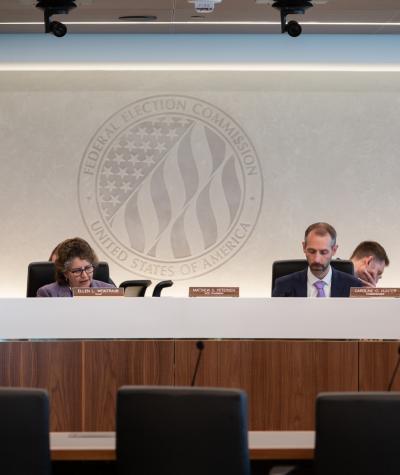Last Friday, the Department of Justice announced the indictment of U.S. entertainer and businessman Prakazrel “Pras” Michel and Malaysian financier Jho Low on charges of conspiracy and fraud, involving a scheme to make and conceal foreign campaign contributions to committees supporting President Obama’s re-election in 2012.
The case is a disappointing, if not surprising, coda to an FEC complaint we filed in 2015 flagging some of these very contributions—a complaint the FEC ignored for over a year and then ultimately dismissed after a deadlocked vote.
It stands as an object lesson in how the FEC’s persistent refusal to enforce our campaign finance laws enables foreign actors, who are not permitted to engage in political activity in the U.S., to infiltrate our elections. According to the Michel indictment, it has happened already.
Friday’s indictment is just the latest revelation in a sprawling global corruption scandal involving the alleged misappropriation of billions of dollars from Malaysia’s sovereign investment fund, which Low and others allegedly laundered through an array of foreign and domestic shell companies to fund illicit influence-peddling and other endeavors.
The investigation has reached into some surprising corners of the U.S. finance and entertainment world, from Wall Street investment bankers to Hollywood blockbusters, and even ensnared a former Justice Department official. But the Michel indictment appears to be the first arising out of the 1MDB scandal involving violations of U.S. campaign finance law.
According to the indictment, Michel conspired to use various straw donors to funnel millions of dollars in illegal foreign contributions from Jho Low into two political committees, “Political Committee 1” (which apparently refers to President Obama’s 2012 joint-fundraising committee), and “Political Committee 2,” which refers to a super PAC formed in September 2012 called Black Men Vote.
CLC’s FEC complaint in 2015 focused on Michel’s contributions to “Committee 2”: he routed approximately $1.1 million into the super PAC Black Men Vote, making two contributions in his own name and two in the name of a single-member Limited Liability Company (LLC) controlled by Michel called SPM Holdings LLC.
Our FEC complaint alleged that Michel’s LLC was being used to conceal the true identity of the donor to Black Men Vote, following a Center for Public Integrity report questioning whether Michel was the true source of the contributions from SPM Holdings LLC.
In his response to the Commission, Michel filed a declaration asserting that he was behind all four contributions to Black Men Vote and that “he had no reason to hide the true source of [his] donations.”
That, according to the indictment, was not true.[1] But the FEC took it at face value, and dismissed our complaint—even though Michel had ostensibly admitted to violating the law that prohibits anyone from making a contribution “in the name of another.”
And it gets worse: the Commission was also unable to pursue any kind of enforcement action, or even authorize an investigation, in four other cases with similar fact patterns that were considered alongside the Michel complaint.
CLC and Democracy 21 filed five complaints between August 2011 and April 2015 alleging that LLCs had been used to mask the identities of both Democratic and Republican donors who gave contributions to super PACs ranging from $857,000 to over $12 million. Several of the donors openly admitted to the media that they contributed through LLCs and other opaque corporate entities to hide their identities from the public.
The FEC sat on our complaints until 2016, deadlocked on whether to find “reason to believe” the law had been violated, and then dismissed all five together; the three Commissioners who refused to proceed acknowledged that these schemes violated the law’s plain text, but claimed that these violators lacked “fair notice” of the law’s parameters.
Since then, CLC has continued to highlight how shell corporations are being used to evade disclosure laws. We’re still challenging the 2016 dismissals in court. And we are still trying to hold the FEC to its word that it will enforce the law against at least some of these violations going forward.
But as far as we know, the Commission has been unable to muster the votes to authorize even an initial investigation in any of the LLC straw-donor complaints filed after three commissioners announced this new “policy” in 2016.
That failure opens a clear avenue for secret election spending, including by foreign actors. There may not be a massive global corruption scandal lurking beneath every straw-donor contribution case—but there was in this one. And, unless the FEC can rise above its perpetual dysfunction and gridlock, there will likely be another.
[1] When documents in the administrative file were made public, we found out that Michel’s lawyers had accused CLC of “using Mr. Michel as a pawn to conduct a public relations campaign” and “abusing the Commission’s complaint process,” and demanded that we “be held to account for doing so.” But as detailed in the indictment, Michel was apparently the one “abusing the Commission’s complaint process”—by filing a false declaration, for which he was charged on three counts of concealment and false statements.

